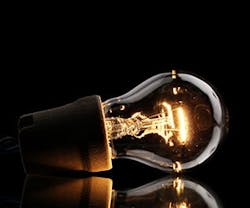Incandescent Bulb Phase-Out Myths Debunked
The New Year is bringing big changes to the lighting industry. The final step of the Energy Independence and Security Act takes effect January 1, 2014, which means that incandescent 40- and 60-watt bulbs can no longer be manufactured. According to Osram Sylvania’s Socket Survey, only four out of ten Americans are aware of these changes. Facility managers have dealt with light phase-outs before, with 100-watt (2012) and 75-watt (2013) bulbs in the past. See tips for dealing with lighting phase outs.
According to Lowe’s, here are five things you need to know about the change:
- You can keep your current bulbs. According to the legislation, consumers can still use their existing incandescent light bulbs and retailers are allowed to sell bulbs they have on their shelves and in stock. Manufacturers are simply required to stop producing non-compliant products. Some specialty types of incandescent light bulbs, such as reflectors, three-way, appliance, and some decorative bulbs, are exceptions to the law and can still be manufactured.
- You won't notice a major difference. Halogen light bulbs are a popular pick by interior designers because of their crisp, white light and welcoming ambiance. For customers who love the look and feel of incandescent light bulbs, there is no need to worry. Manufacturers have developed halogen light bulbs that both meet the new efficiency standards and offer the characteristics of traditional bulbs. While these bulbs may cost more up front, they pay off in the long run by saving 28% in energy costs over the life of the product.
- You won't replace your bulb until your baby graduates from college. It's a great time to upgrade to LED light bulbs as prices have steadily decreased while performance and appearance have improved. According to Lowe's manufacturers, an average LED bulb will last more than 22 years (based on three hours of usage per day), and over its lifetime will cost about $30 to operate, whereas an incandescent bulb will cost $165 over the same period of time. Lowe's carries a wide variety of LED bulbs for almost every household application with prices starting under $10.
- These aren't the CFLs of years past. CFLs, one of the most popular replacements for incandescent bulbs, have changed dramatically with recent technological improvements. Manufacturers have addressed common customer feedback so that these bulbs now create better light output and turn on faster when you flip a switch. Once considered a safety concern because of mercury content, today's CFLs contain less mercury than a common household thermometer.
- There's a full light spectrum for different applications. Light bulbs are available in a variety of color temperatures and should be selected based on application and personal preference.
